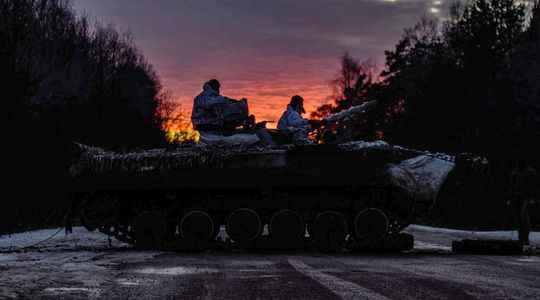The sounds of boots are getting closer. Russia conducted exercises on Saturday involving the firing of heavy missiles, a new show of force from Moscow at a time when Washington says it is convinced of an imminent invasion of Ukraine. Later in the afternoon, mortar shells exploded near Ukrainian Interior Minister Denys Monastyrsky during his trip to the front line in the east of the country, AFP journalists noted on Saturday. For his part, Ukrainian President Volodymyr Zelensky spoke during a speech in Munich. The head of state asked the West to stop their policy of “appeasement” of Russia and demanded a “clear and achievable” timetable for Ukraine’s accession to NATO, calling Ukraine a “shield of Europe”. In the east of the country, two soldiers were killed on Saturday in a new outbreak of violence on the front line with pro-Russian separatists.
The latter, who accuse Kiev of wanting to attack them, announced on Saturday a “general mobilization” of men able to fight, after having ordered the evacuation of civilians to neighboring Russia the day before. The Ukrainian president has proposed a meeting with Vladimir Putin. “I don’t know what the Russian president wants, that’s why I propose that we meet,” he said. The head of the Kremlin personally supervised “strategic” exercises on Saturday with the firing of “hypersonic” missiles, new weapons he has previously described as “invincible” and capable of carrying nuclear charges. “The main objective of the exercises is to train the strategic offensive forces to inflict a guaranteed defeat on the enemy,” Russian Chief of Staff Valery Gerasimov said in a videoconference meeting, where Vladimir Putin appeared alongside his Belarusian counterpart Alexander Lukashenko.
In such a context, the Quai d’Orsay has decided to sound the alarm. This Saturday, France now recommended that all its nationals leave Ukraine and called on those in the areas most exposed to the risk of war in the east of the country to leave “without delay”. So far, the French Foreign Ministry has only advised to “defer all trips to Ukraine”. Same story in Germany, which for its part called on its nationals to leave Ukraine “urgently” and warned “against any movement” in the country. FurthermoreLufthansa will suspend regular flights to Kiev and Odessa from Monday until the end of February, a spokesperson for the German airline said, amid fears of an invasion of Ukraine by the Russia are at their highest.
Berlin calls for “not presuming” Moscow’s decisions
During this busy day on the diplomatic front, Germany, which holds the presidency of the G7, expressed a certain annoyance towards its American ally. Berlin says it has distanced itself from the belief of the United States that a Russian attack in Ukraine is decided and imminent, calling for “not to assume” Moscow’s decisions. Indeed, the Americans still accuse Moscow, which has massed tens of thousands of troops near Ukraine’s eastern borders, of preparing to attack that country. The Russians “are deploying and getting ready to strike,” US Secretary of Defense Lloyd Austin said on Saturday during a visit to Lithuania, adding that soldiers from Moscow “are moving to the right positions. to be able to carry out an attack”.
The day before, US President Joe Biden said he was “convinced” that Vladimir Putin had decided to invade Ukraine, and that the multiplication of clashes was intended to create a “false justification” to launch an offensive. But he left the door open to dialogue. As long as an invasion hasn’t happened, “diplomacy is always a possibility,” he said. In this sense, a meeting between its Secretary of State Antony Blinken and Russian Foreign Minister Sergei Lavrov is scheduled for next Thursday. The Kremlin continues to deny any intention to attack its neighbour, a pro-Western country that the Kremlin wants to bring back into its sphere of influence. But he demands guarantees for Russia’s security, such as the withdrawal of NATO’s military infrastructure from Eastern Europe and the assurance that Ukraine will never join the Alliance, demands deemed unacceptable by Westerners.
Boris Johnson calls for ‘unity’
Moscow’s concerns about Ukraine must “be respected”, Chinese Foreign Minister Wang Yi said on Saturday. From Munich, British Prime Minister Boris Johnson called on him for “unity” among Western allies, while US Vice-President Kamala Harris spoke of the threat of NATO strengthening in eastern Europe. Europe in the event of a Russian attack and warned Moscow of “severe and rapid” economic sanctions. On the front in eastern Ukraine, the Ukrainian armed forces and pro-Russian separatists accused each other on Saturday of new serious ceasefire violations. Kiev announced the death of one of its soldiers during these clashes. The Ukrainian army reported 66 exchanges of mortar fire, 82 and 110 mm caliber, on the towns of the front until 07:00 (04:00 GMT), a high number.
And OSCE monitors said on Saturday they had seen a “dramatic increase” in ceasefire violations, to a total of 870 on Friday. According to them, the number of armed incidents on the front line is now the same as before July 2020, the date of an agreement to strengthen the ceasefire. Pro-Russian separatists and Ukrainian forces have been fighting since 2014 in eastern Ukraine, in a conflict that has already claimed more than 14,000 lives. The European Union (EU) announced on Saturday that it was coordinating the delivery of humanitarian aid to Ukraine, contributing to the delivery by air of medical supplies and protective equipment requested by Kiev.
